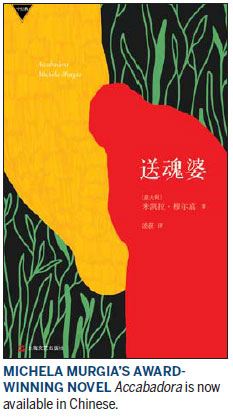'Midwife to the dying' in Sardinia

Michela Murgia unveils a Chinese translation of her Italian novel on so-called mercy killing in the 1950s
Chinese readers are getting a chance to know an Italian writer who is not among the traditional big names.
Michela Murgia, 44, who was born in the Italian autonomous region of Sardinia, recently unveiled a Chinese translation of her award-winning novel Accabadora in Beijing.
| Michela Murgia, Italian author. Photos Provided to China Daily |
Murgia's novel spotlights an illegal yet revered profession, known as accabadora, in her hometown in the 1950s. The Sardinian term loosely means "midwife to the dying" - people who gave critically ill patients a quick end with familial consent, somewhat similar to what today is called euthanasia.
The methods are different, though. Bonaria Urrai, the story's protagonist, does it with the help of a small bottle of anesthetic and a soft pillow. Back then, Murgia says, some did it with a hammer and others used cruder means.
"Bonaria simply uses a pillow. What matters is not how they end it," Murgia says in Italian. "It is how to accompany a man to the end of his life. This is an endless debate in Italy."
She spoke to China Daily with the help of an interpreter.
The practice of accabadora was never legalized in Italy, and it has been discontinued. In Murgia's words, the idea behind the existence of an accabadora is that no one is born without another person's help, and no one should have to leave without someone's help.

"Some people say, 'Oh, you're so ahead of your time in Sardinia. You had euthanasia so long ago.' I say, No. What the accabadora does is not euthanasia," Murgia says.
"Life in Sardinia used to be very fragile in the olden days. ... We needed the accabadora for that reason," she says, adding that the region's economy was weak and medical care was underdeveloped.
Having said that, in her novel, Bonaria, the female "mercykiller" never takes an old man's life if her principles aren't first satisfied. They are simple and clear: The patient has to be dying in agony, with absolutely no hope of recovery, and the family members, including the patient if conscious, must specifically ask for it.
When a family of six invites Bonaria to "bring peace" to their old father, who had been in bed for months, they claim the old man had lost his voice and they are making a plea on his behalf. But when Bonaria asks to be left alone with the old man, he grabs her wrist and tells her hoarsely how his sons want to get rid of him.
Bonaria storms out of the room and throws the most vicious curse she knows at the family.
"You said he couldn't speak. For the monstrous lie you told me, your children, born and unborn, shall never die in peace," the novel has her as telling the sons. "Feed him (the old father), and if he starves, you shall never fall asleep in life."
"Our education and society should aim to protect the weak," Murgia says. "If we cannot do that, we are going in the wrong direction."
Following a Sardinian tradition, Murgia was given away to an adoptive family at age 18, as a fillus de anima, their "soul child". Interestingly, in her novel, the other main character, Maria Listru, is also the "soul child" of Bonaria.
Murgia says her fiction is to some extent based on personal accounts of her relatives and friends. Though born in the 1970s, the writer set her story in the '50s because she grew up with her grandparents' tales and "mentally lived in the old times" of rural Sardinia.
Despite being an atheist, the politically active novelist, a frequent speaker on women's rights, holds a balanced view on secular laws.
"Italy is putting too much emphasis on efficiency, making standards accordingly," Murgia says, adding that laws should be made taking into consideration human factors such as faith.
The novel won Murgia several awards in Italy, including the prestigious Premio Camxpiello.
chenmengwei@chinadaily.com.cn
(China Daily Africa Weekly 04/08/2016 page20)
Today's Top News
- Macao SAR holds flag-raising, reception to mark 26th anniversary of return to motherland
- China issues rules to regulate pricing practices of internet platforms
- US hits over 70 IS-linked targets in Syria in massive retaliatory strikes
- Technological innovation brings cultural heritage alive
- Consumption to play bigger part in growth
- Opposition moves to impeach Lai































